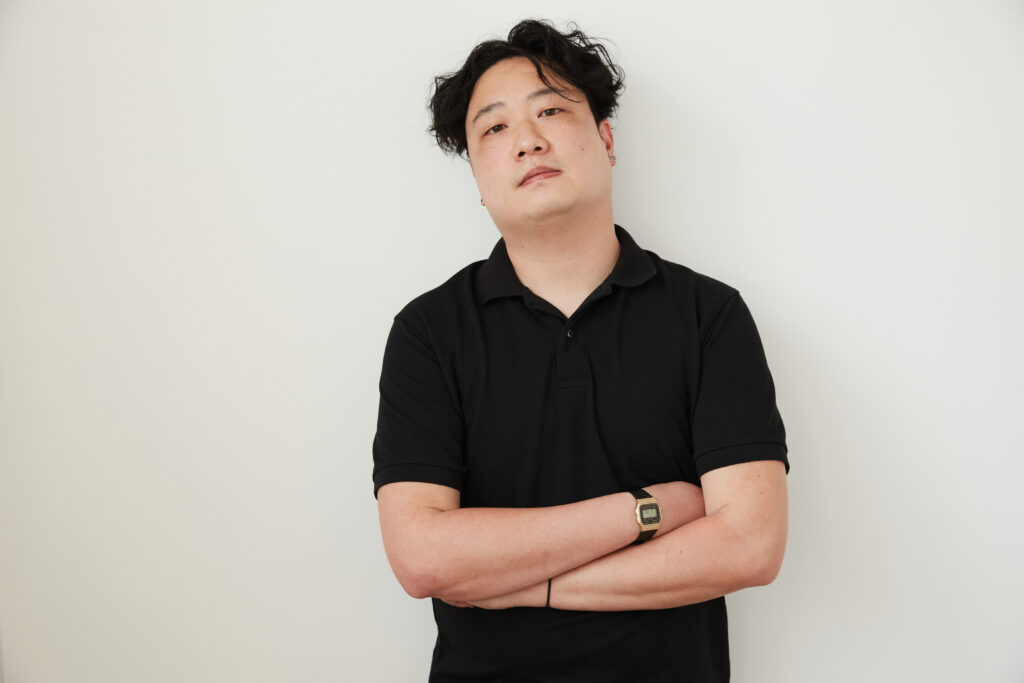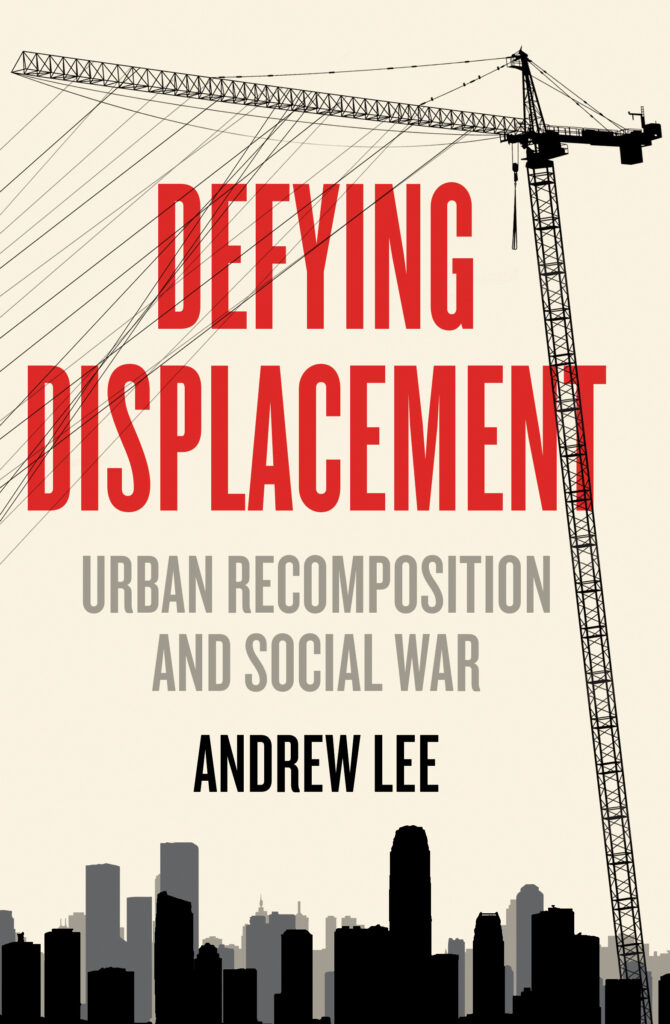An interview with Andrew Lee, author of Defying Displacement: Urban Recomposition and Social War

In this interview with Andrew Lee, the author of Defying Displacement: Urban Recomposition and Social War (AK Press, 2024), we talked about how to better understand gentrification and make our struggles against displacement more effective. We discussed how to understand class tensions when those doing and experiencing displacement are technically both “workers”—what it would mean to think of the dividing line as between those who benefit from the gentrification economy, and those who are targeted by it. In this discussion, we focused on what this analysis means for actual organizing, and the limits of electoral or other types of work, when the real energy is at the militant edge of anti-displacement struggles in confronting global capital.
Lee’s book asks us a couple of central questions: how do we understand the terrain of resource and power distribution in our current moment and, more importantly, what do we do about it? What are the analyses and tactics that will build useful conditions for revolutionary potential?
Lee argues that the fight against gentrification and displacement is the “leading edge of confrontation with the contemporary ruling class.” In this context, he raises the possibility that antagonisms over access to urban space, infrastructure, and material flows of resources can produce a collective consciousness, like the shop floors used to before so many of them were dissolved into precarious gig work.
Opening a conversation rather than providing concrete answers, Lee points out some places where our longstanding theories of labor, power, and revolution have become stuck and stale, in ways that misrepresent where our actually existing militant potential lies.
I sat down with Lee to speak about these questions, their contradictions, and what the current moment demands of us:
J: This book hits on a lot of conversations I’ve been having lately around whether theories we’ve inherited are enough for our current moment, and where to put our organizing energies when the violences we’re facing, especially with things like displacement, evictions, and sweeps are so urgent.
Andrew Lee: One of the big pushes I’m making in my book is that we shouldn’t try to find recipes in very different social, economic, and spatial contexts for what’s going to work under these new circumstances.
J: That’s one of the spicier takes in the book that I wanted to hear more about. You talk about reframing class war towards who benefits from the gentrifier economy and who doesn’t. How do you think about production and labor organizing in that context?
Andrew Lee: The question isn’t “are unions good?”—for most people it’s better to have workplace protections and a contract. The question we need to ask is: are unions inherently a part of a revolutionary strategy? I think, obviously, there is a divergence in interest between workers and bosses in general. But what does a worker in the informal economy targeted by gentrification have in common with a highly paid software engineer, just because they both get paychecks?
Gentrification and anti-gentrification struggles are certainly about economic class and our relationship to production. But the dividing line is between the people who are inside the gentrification economy, and those who are on the outside.
J: And the people being gentrified are also the ones pushed into precarity without a shop floor to organize from—which is why, as you point out in the book, it can be easier to organize more highly-paid and stable workers, the ones who benefit from the gentrification economy. Then how do we find and focus on the points of actual potential militancy?
Andrew Lee: Well, if you think of the late nineteenth and early twentieth century, people organizing at the point of production in these giant factories didn’t wait around for leftist theory to be handed to them to give them the idea—these revolts were already happening. How do we encourage already existing revolts in a direction that will lead to broader liberation and emancipation of working people, and then everyone else?
We can’t miss that the most vibrant militant edge of the class struggle in cities around the world is between those getting gentrified, and those doing the gentrifying.
J: To me, this begs the tactical question of where to put our energies. In anti-displacement work there are a couple traps I see us falling into. The first is the legal and political sphere, which sucks so much organizing energy out of people.
Andrew Lee: Maybe I’m getting soft in my old age, but I think we have to engage. It’s a gift to our enemies if we cede the space entirely. When thinking about electoral engagement, the number one question not only our opponents, but also our potential friends, will ask us is: well, why didn’t you try?
J: Yeah, I’ve seen that. And we do need to push the city to not just throw away people’s belongings, or just kick people out of shelters without a process, but it absorbs so much political energy into council meetings and electoral work that sometimes bring us back to where we started.
Andrew Lee: Well, I think we can approach any of these things in a principled or an unprincipled way, as with any tactic. An unprincipled way to participate in the electoral arena is to think that if this politician gets elected or votes our way then the system’s great and we just bracket all of the other ways we’re getting exploited, oppressed, and killed.
I think that there’s a principled way to engage that doesn’t involve lying to our neighbors, our comrades, our gods, and ourselves. If a politician votes the way we want, we can say: thank you so much, but if it was possible to vote against displacement now, why haven’t you and all of your colleagues been doing this for the last 50 years?
There are real structural reasons why a supposedly elected representative would do something that’s obviously against the interests of so many constituents: it’s baked into the system. At some point, we need to pull ourselves out of the electoral system, and say we’ve done as much as we can. The system is rotten.
J: Completely. And then another trap I also see us getting stuck in is approaching mutual aid in a way that just makes us the worst-funded nonprofit, instead of an orientation towards survival pending revolution. Harm reduction is crucial—people need tarps, clean needles, dry socks, and to not be evicted today—but it seems like we get stuck in the survival and the revolution never seems to happen.
Andrew Lee: We need to think of both electoral work and mutual aid as arenas for the accumulation of forces. There are ways to pull people together, into liberatory movements that can push for the abolition of the systems that are oppressing people and forcing them out of their homes to die in the streets.
Are we building survival pending revolution? Are we really centering the liberation of ourselves and the people who are receiving aid, in our thinking, in our conversations, and in our planning? Or are we just alleviating some sense of guilt? At some point we need to overturn the conditions that make this aid necessary.
J: This makes me wonder about defensive tactics we can do right now that can move us towards more offensive ones when the moment presents itself.
Andrew Lee: There will be another crisis like 2020; there will be another generalized uprising. And we need to be ready to step into that breach and be like—okay, we’re actually done with this shit.
Fights against gentrification are not only crucial because they preserve our communities, they preserve our families, and they preserve our lives. But they also have the potential to have truly revolutionary implications.
Because this funny thing happens around the world where as soon as communities targeted for displacement by these developments start articulating anti-gentrification demands, they find themselves facing off against their entire city council, global financial institutions, and the largest employers in their state. All of a sudden, people get into direct conflict with the upper echelons of global capitalism.
J: And what I’m really hoping is that this conflict doesn’t just get funneled into a whole bunch of low- or no-income public housing that won’t actually shake the system and we think: great, we’re done, we won. How can we get to the point of decommodifying land and shelter, the point where housing is a home, and not some type of speculative real estate investment or financial asset?
Andrew Lee: I think that we need to have an openness to the movements we’re immersed in, articulating an offensive politics of anti-gentrification. I don’t know what that looks like, but the fact that so many of us in the richest cities across the world need to fight the same five dozen dudes to stop our neighborhoods from getting priced out has never happened before in human history. So now we get to see what the emergent strategy is that we can create between our communities, between our cities, and between our struggles to take the strategic initiative against this owning class.
Anti-gentrification struggles suck, because it’s always like you and eight moms versus the richest company in the world. But we need to remind ourselves that we are the overwhelming majority. There are struggles against displacement on every continent in the world—in Cape Town, Santiago, Mexico City, Seoul. And I think we might truly be on the cusp of articulating ways to truly confront this beast and to win.

Andrew Lee has been involved with grassroots anti-displacement campaigns in San José, California. He currently lives in Philadelphia, where he continues to work on similar issues. He has written for Yes! Magazine, Teen Vogue, and The Progressive and serves as Managing Editor for The Anti-Racism Daily.
Juliet is three generations deep from the Bay Area and is sick of watching family, friends, and neighbors get displaced.
